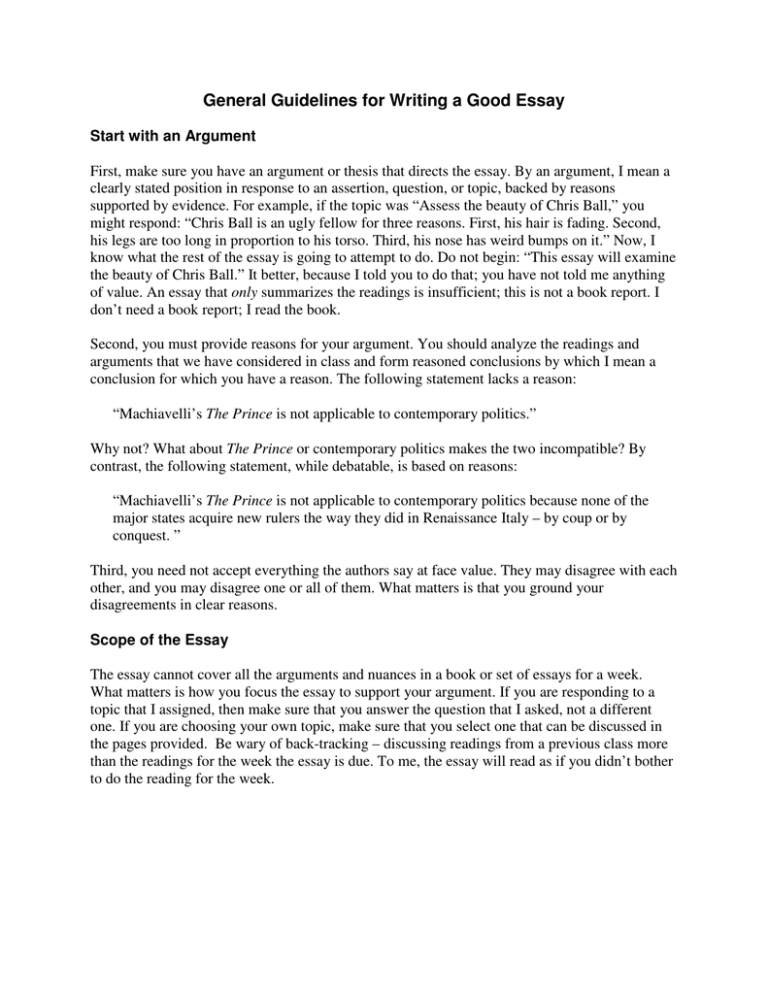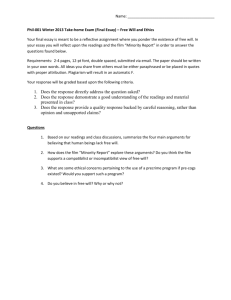General Guidelines for Writing a Good Essay
advertisement

General Guidelines for Writing a Good Essay Start with an Argument First, make sure you have an argument or thesis that directs the essay. By an argument, I mean a clearly stated position in response to an assertion, question, or topic, backed by reasons supported by evidence. For example, if the topic was “Assess the beauty of Chris Ball,” you might respond: “Chris Ball is an ugly fellow for three reasons. First, his hair is fading. Second, his legs are too long in proportion to his torso. Third, his nose has weird bumps on it.” Now, I know what the rest of the essay is going to attempt to do. Do not begin: “This essay will examine the beauty of Chris Ball.” It better, because I told you to do that; you have not told me anything of value. An essay that only summarizes the readings is insufficient; this is not a book report. I don’t need a book report; I read the book. Second, you must provide reasons for your argument. You should analyze the readings and arguments that we have considered in class and form reasoned conclusions by which I mean a conclusion for which you have a reason. The following statement lacks a reason: “Machiavelli’s The Prince is not applicable to contemporary politics.” Why not? What about The Prince or contemporary politics makes the two incompatible? By contrast, the following statement, while debatable, is based on reasons: “Machiavelli’s The Prince is not applicable to contemporary politics because none of the major states acquire new rulers the way they did in Renaissance Italy – by coup or by conquest. ” Third, you need not accept everything the authors say at face value. They may disagree with each other, and you may disagree one or all of them. What matters is that you ground your disagreements in clear reasons. Scope of the Essay The essay cannot cover all the arguments and nuances in a book or set of essays for a week. What matters is how you focus the essay to support your argument. If you are responding to a topic that I assigned, then make sure that you answer the question that I asked, not a different one. If you are choosing your own topic, make sure that you select one that can be discussed in the pages provided. Be wary of back-tracking – discussing readings from a previous class more than the readings for the week the essay is due. To me, the essay will read as if you didn’t bother to do the reading for the week. Do Not Ignore Counter-arguments or Counter-evidence Always address obvious counter-arguments to your thesis. For example, if you argued that George W. Bush was too quick to use force, you would want to explain why he did not use force against North Korea or Iran. Examples vs. Research These are not research essays. There is no need to do new research to get a good grade on them (indeed, you may get a poor grade by failing to discuss the readings sufficiently). You should, however, use examples to illustrate your arguments. They can be drawn from the readings, lecture, periodicals, or from work in other courses. Nevertheless, you may not use outside readings to the exclusion of the readings for this course. It is essential to explain why the example is relevant. Detailed stories are unnecessary, but you should write a sentence or two showing how the example relates to your claim. Do Not Plagiarize! Do not plagiarize. Do not plagiarize. Do not plagiarize. Do not plagiarize... ISU’s policy on academic honesty is reproduced here. This checklist might be helpful. Citations You should be citing from the readings. For required course readings – those listed on the syllabus – simply cite the author’s last name and the page number. You can do this parenthetically or in a footnote: Hobbes theory is structural (Doyle, p.113). When it is clear from the context of the sentence, just cite the page number parenthetically: Doyle argues that Hobbes’ theory is structural (p.113). Note that the period comes after the closing parenthesis. When citing outside sources, use either the Modern Language Association or Note style. If using MLA, do not underline titles, as they show, but rather italicize (underlining was used to substitute for italics because most typewriters lacked italic type; with computer, we have italic type so underlining is unnecessary. This Dartmouth link gives examples. When we read the essays in Keohane, be sure to cite the essay’s author, not Keohane. Spell-Checker May Deceive You Print a draft to proofread, or have a friend proof-read it. An essay with many misspelled words and grammatical errors will be down-graded. I have to be able to understand what you are saying. Use Quotations and Block Quotes Sparingly The purpose of this paper is to show that you have understood the readings. Simply copying what the authors have written does not demonstrate this. Do not fill your paper with direct quotations from the readings. Any dolt can copy out of the book, so do not use block quotes like this extensively. Guide Your Argument with Headers You might consider using headers (the text above this sentence is a header) to guide your argument. The header should be concise. You should not break questions down into subquestions in your essay. You should be writing coherent essays, but you may use headers as a way of outlining your arguments. If you have a talent for writing good segues, then headers may be redundant. Abjure Diatribes, Polemics, and Rants Discuss one of the topics that I assigned. Do not pen a screed against inhumanity or idiocy in war that you have wanted to write. If you want to make a political statement, submit an op-ed to a campus paper or journal, start a blog, write your legislator, or hold rally. But raging against the machine to me will neither gain you a good grade nor advance your cause because even if you persuade me to accept your views, I have no power to alter the course of history. Be Clear Rather Than Clever Do not try to toss around jargon that you do not understand or use a three-syllable word when a one-syllable word will do. Do not try to make things sound more important than they are (you might read George Orwell’s essay “Politics and the English Language” or listen to George Carlin’s airline announcement routine for a further exposition of what I mean). If you choose the latter, pay careful attention to the next item. Avoid Profanity and Glibness Profanity – the seven words (and many others) you can’t say on the radio – does not sound as clever in written work as it does in a comedian’s monologue or my lectures. Unless you are Rowan Atkinson (and you are not), be wary of using sarcasm in essays. Being glib may make your essay appear poorly reasoned. A dry paper that has good evidence and arguments will do better than a colorful paper that places style over substance. Keep Conclusions Concise Make sure that your conclusion actually concludes the paper. You should simply be summarizing the argument of your paper in the last paragraph. Do not raise new topics in the last paragraph. If it was relevant, you should have discussed it in the body of the paper.




